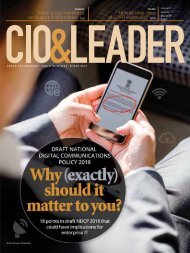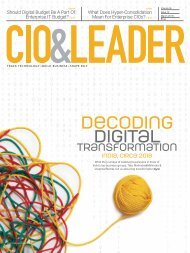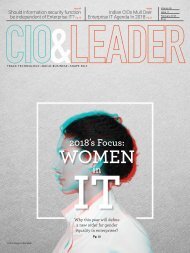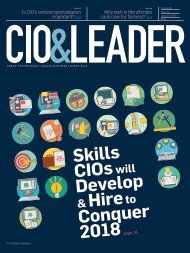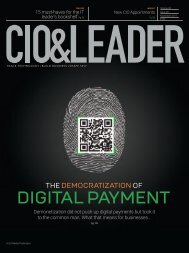white_paper_on_data_protection_in_india_171127_final_v2
Create successful ePaper yourself
Turn your PDF publications into a flip-book with our unique Google optimized e-Paper software.
2. Child’s C<strong>on</strong>sent<br />
It is estimated that globally, <strong>on</strong>e <strong>in</strong> three Internet users is a child under the age of 18. Keep<strong>in</strong>g<br />
<strong>in</strong> m<strong>in</strong>d their vulnerability and <strong>in</strong>creased exposure to risks <strong>on</strong>l<strong>in</strong>e, a <strong>data</strong> protecti<strong>on</strong> law must<br />
sufficiently protect their <strong>in</strong>terests.<br />
For a fuller discussi<strong>on</strong>, see page 85 above.<br />
Questi<strong>on</strong>s<br />
1. What are your views regard<strong>in</strong>g the protecti<strong>on</strong> of a child‘s pers<strong>on</strong>al <strong>data</strong>?<br />
2. Should the <strong>data</strong> protecti<strong>on</strong> law have a provisi<strong>on</strong> specifically tailored towards protect<strong>in</strong>g<br />
children‘s pers<strong>on</strong>al <strong>data</strong>?<br />
3. Should the law prescribe a certa<strong>in</strong> age-bar, above which a child is c<strong>on</strong>sidered to be<br />
capable of provid<strong>in</strong>g valid c<strong>on</strong>sent? If so, what would the cut-off age be?<br />
4. Should the <strong>data</strong> protecti<strong>on</strong> law follow the South African approach and prohibit the<br />
process<strong>in</strong>g of any pers<strong>on</strong>al <strong>data</strong> relat<strong>in</strong>g to a child, as l<strong>on</strong>g as she is below the age of 18,<br />
subject to narrow excepti<strong>on</strong>s?<br />
5. Should the <strong>data</strong> protecti<strong>on</strong> law follow the Australian approach, and the <strong>data</strong> c<strong>on</strong>troller<br />
be given the resp<strong>on</strong>sibility to determ<strong>in</strong>e whether the <strong>in</strong>dividual has the capacity to<br />
provide c<strong>on</strong>sent, <strong>on</strong> a case by case basis? Would this requirement be too <strong>on</strong>erous <strong>on</strong> the<br />
<strong>data</strong> c<strong>on</strong>troller? Would rely<strong>in</strong>g <strong>on</strong> the <strong>data</strong> c<strong>on</strong>troller to make this judgment sufficiently<br />
protect the child from the harm that could come from improper process<strong>in</strong>g?<br />
6. If a subjective test is used <strong>in</strong> determ<strong>in</strong><strong>in</strong>g whether a child is capable of provid<strong>in</strong>g valid<br />
c<strong>on</strong>sent, who would be resp<strong>on</strong>sible for c<strong>on</strong>duct<strong>in</strong>g this test?<br />
Alternatives:<br />
a. The <strong>data</strong> protecti<strong>on</strong> authority<br />
b. The entity which collects the <strong>in</strong>formati<strong>on</strong><br />
c. This can be obviated by seek<strong>in</strong>g parental c<strong>on</strong>sent<br />
7. How can the requirement for parental c<strong>on</strong>sent be operati<strong>on</strong>alised <strong>in</strong> practice? What are<br />
the safeguards which would be required?<br />
8. Would a purpose-based restricti<strong>on</strong> <strong>on</strong> the collecti<strong>on</strong> of pers<strong>on</strong>al <strong>data</strong> of a child be<br />
effective? For example, forbidd<strong>in</strong>g the collecti<strong>on</strong> of children‘s <strong>data</strong> for market<strong>in</strong>g,<br />
advertis<strong>in</strong>g and track<strong>in</strong>g purposes?<br />
215



